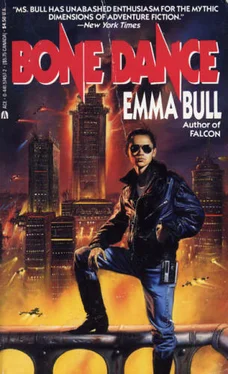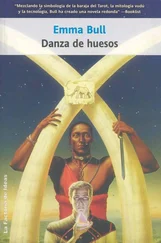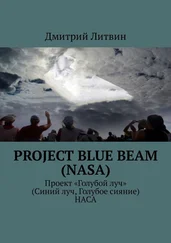Frances sat where I’d left her, but her wrists were crossed over the instrument panel, and her forehead was pillowed on them. Her hair had fallen forward to sweep and scatter across her near forearm. Relaxed, that arm looked surprisingly thin, and the pointed bones in her elbow seemed frail and vulnerable. Out of character.
Sometimes wisdom arrives first in the pit of your stomach. That was where I felt it then, a little slippery twist. Of course it was out of character. That wasn’t Frances’s arm.
I already knew that this body didn’t belong to Frances; but now I really knew it, all the many-sided shape of it. There was no relation here between the shell and the spirit, no way to judge from outside, except by the crude language of action and expression, what the person inside was. The body I was looking at was the life story, in fading ink, of a person I’d never met.
Who was she? Would she approve of this vendetta she was being ridden on? I’d awakened, over and over, in strange places with bits of my past gone, and it had nearly driven me crazy. How long had Frances ridden this woman? Would she wake up in a new city, maybe years since her last memory, and do any better than I had? Would she get the chance to wake up at all?
The exhaustion belonged to the stranger’s body. The driving passion, the mind under the lash, belonged to Frances. Both needed to eat and rest. Both would suffer if they didn’t. Whoever was entitled to judge between them, it wasn’t me.
I said, a little loudly, “Well, if you didn’t like spicy chicken, you should have said so.”
“I love spicy chicken,” she said, and sat up. Her face was composed, and I knew I wasn’t supposed to notice, or at least to comment on, the weariness in it.
So I said, “At the Underbridge, there’s a place where you can catch a few hours’ sleep.”
“I’ll be fine once I eat. Now, can we eat?”
“You’re welcome,” I replied, and began to set bundles on all the flat surfaces. There weren’t a lot of these, on or in the trike, but I ate leaning against the outside, which left her the passenger’s seat as a table. “Eat the okra first,” I warned. “It’s terrible cold.”
And that was the last conversation for a few minutes. Except for the rattle of the paper, we were a speck of silence in the Night Fair’s tapestry of noise. I stopped chewing to listen to it. I felt like an alien object in the world-body, something it had encysted because it couldn’t cast it out. Or was it Frances who had been isolated, and I was simply standing within the radius of the effect?
“Wish I had some coffee,” Frances said at last, around a bite of biscuit.
I stared at her. “Nothing easier. Give me ten bucks, and I’ll be back sometime tomorrow with about twelve green coffee beans. If someone, somewhere in town, has managed to lay hands on a sackful.”
She smiled, wry and surprisingly genuine. “I know. I think that’s the rest of my penance. To get to where coffee grows, it’s a thousand miles over bad roads full of unpleasant people. I hear there’s a slope near Taos where they’ve discovered it does pretty well, but strangers within half a mile can expect to be shot at.”
“Is coffee worth shooting people for?” I asked.
“Or getting shot at for? Have you never had it?”
“No.”
An indecipherable expression crossed her face at high speed. “In that case, I suppose not. But I wish I had some, all the same.”
Headlights appeared and bobbed in front of us, blinding, as a car turned into the other end of the alley. “Bother,” Frances said, and began to clear wrapping paper away from the ignition.
“Stay where you are, please,” said an air-filled whistling ruin of a voice behind me.
I was drinking the last of the pear nectar. As I lowered the bottle, I reversed my grip on the neck, smacked the glass against a sign post as I turned, and ended crouched in front of Mr. Lyle with a broken bottle in my hand. I was probably more surprised than he was.
He was smiling, in fact, ‘way up at the top of his great height. I’d forgotten how unreasonably large he was. “Teakettles, bottles—do you always fight with your drinkables?” he asked. And: “You should turn round and have a look before you use that. There are things you don’t know.”
I did not, of course, turn around. “Frances?” I called.
“I don’t—” I heard the clunk-squeak of a car door opening. “Ah. I see,” she said. “Sparrow, before I decide how to manage this, tell me, who are these people?”
I was frantic to look behind me. People, plural; the woman must be there. I tried to figure out what Frances wanted to know. “Night before last, Mick saw their car and avoided it,” I said slowly. “Then yesterday, when Mick left his last body at my place, I went to someone—someone I thought I could trust—to help me get rid of it. She brought these two around. They were pretty peevish when they found out Mick wasn’t resident anymore.”
“Is that true?” Frances asked, but not, I realized, of me.
“It is so, absolutely,” said the other familiar voice, the rough, low-pitched female one. I could hear that she, too, was smiling. “A careful witness, that one, who draws no conclusions. But it is not all that is so.”
“What do you want?” said Frances.
“That we should help one another, maybe.”
In failing tones, with a fortune in skepticism, Frances said, “And this, I take it, is symbolic of your good intentions. My God.”
“And which one is yours?”
I couldn’t bear it anymore. I looked over my shoulder.
The long black car had pulled out of the alley at as much of a diagonal as it could manage; it blocked the sidewalk as well. The woman Dana had addressed as “Maitresse” stood in the open passenger’s side door. Her costume yesterday must have been casual wear. Now she was a different kind of formidable: black suede pumps, long dark legs, a black sheath dress of dull nubby silk, a fur stole white as a cloud of talcum, long dark neck rising out of it. Her face, under a black-and-white turban, seemed younger than it had yesterday. And still, nothing shone or sparkled anywhere about her except her immobile silver eyebrows.
Behind the wheel was the dark-skinned person in the bright-patterned hat, the one who’d peered in the windshield waving spark plugs. Beside the driver was the big gray dog.
The back door on our side was also open. And on the back seat, head lolling down as if it had been propped against the door before it opened, entirely unconscious, was Mick Skinner’s new body.
Then one of Mr. Lyle’s big hands closed around my wrist, and the other plucked the bottle away, sent it flying to smash on the sidewalk. His fingers closed around my upper arms, pressed them to my ribs. It felt as if he might flatten me between his palms like softened wax. He half walked, half carried me to the car and poked me in the back on a rear-facing seat opposite Mick. I shot across to the other door and tried the handle. No response, and no lock in sight. The driver with the bright hat turned and smiled at me through the glass between us.
“If you will come with us,” the woman said to Frances, “we will go to a safe place, where we may talk. You will not come to harm.”
Frances nodded toward the back seat of the car. “How do I know you have him, and not just a body?”
“He is there,” the woman with the eyebrows said. “You know it.”
“Yes.” Frances’s voice was low, but I heard her.
None of us moved, and time seemed to keep us company. I was waiting for an explosion of violence—soon the rifle would come up in Frances’s hands, there would be lots of noise, and we would probably all die—or a ripple of the bizarre—soon, now, Frances would possess one of them.
Читать дальше












